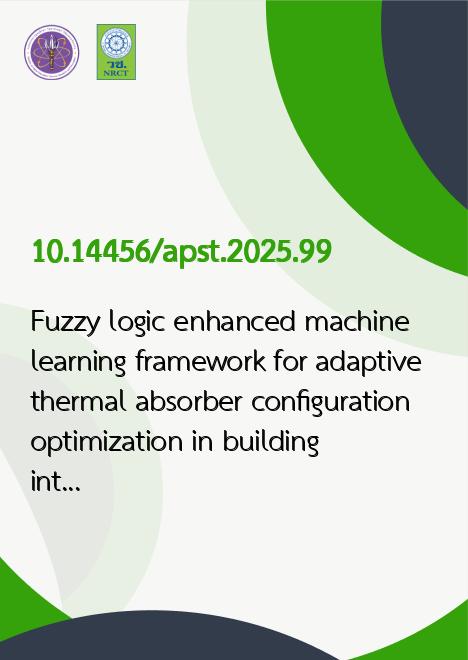
|
Fuzzy logic enhanced machine learning framework for adaptive thermal absorber configuration optimization in building integrated photovoltaic thermal systems |
|---|---|
| รหัสดีโอไอ | |
| Creator | Rashmi Singh |
| Title | Fuzzy logic enhanced machine learning framework for adaptive thermal absorber configuration optimization in building integrated photovoltaic thermal systems |
| Contributor | Dinesh Kumar Nishad, Saifullah Khalid, Raj Sinha |
| Publisher | Khon Kaen University, Thailand |
| Publication Year | 2568 |
| Journal Title | Asia-Pacific Journal of Science and Technology |
| Journal Vol. | 30 |
| Journal No. | 6 |
| Page no. | 16 (17 pages) |
| Keyword | Fuzzy Logic, Building Integrated Photovoltaic Thermal, Machine Learning, Thermal Absorber Optimization, Adaptive Systems, Net Zero Energy Buildings |
| URL Website | https://apst.kku.ac.th/ |
| Website title | https://apst.kku.ac.th/fuzzy-logic-enhanced-machine-learning-framework-for-adaptive-thermal-absorber-configuration-optimization-in-building-integrated-photovoltaic-thermal-systems/ |
| ISSN | 2539-6293 |
| Abstract | Building integrated photovoltaic thermal (BIPVT) systems represent a promising technology for achieving net-zero energy buildings by simultaneously generating electricity and thermal energy. However, optimizing thermal absorber configurations remains challenging due to complex interactions between environmental variables, system parameters, and performance objectives. This paper presents a novel fuzzy logic-enhanced machine learning framework for adaptive thermal absorber configuration optimization in BIPVT systems. The proposed framework integrates fuzzy inference systems with advanced machine learning algorithms to dynamically optimize absorber tube geometries, material properties, and operational parameters. The methodology incorporates real-time environmental data, system performance metrics, and user preferences to provide intelligent decision-making capabilities. Experimental validation demonstrates that the proposed framework achieves 15.3% improvement in thermal efficiency and 12.7% enhancement in overall system performance compared to conventional optimization approaches. The fuzzy logic component enables interpretable decision-making while maintaining robustness under uncertain operating conditions. Results indicate that spiral absorber configurations optimized through the proposed framework achieve the highest performance with 36.4% overall efficiency at 1000 W/m² solar irradiance. |